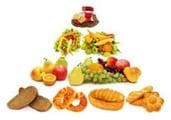Do you want to eat well? You do not know how to do it? Be sure to read the most important principles of Healthy eating – you will learn from them how to eat Healthy. The prize will be better Health, great well-being, increased concentration. Here is our guide to Healthy eating that will help you organize your knowledge about Healthy eating
Why is it worth eating Healthy?
Healthy eating must be individual and mean something different for everyone. Otherwise, a person with insulin resistance needs to eat, and differently with autoimmune diseases. Unfortunately, it sometimes turns out that even products commonly considered Healthy may be harmful for some groups of people. That is why it is so important to observe your body, listen to its response to food and try to choose the best possible Diet for you, and not only good.
It has long been known that care for proper, Healthy nutrition is important for proper growth and maintaining good Health. It avoids many diseases that sometimes develop over many years as a result of eating too much or too little specific nutrients. The most common diseases of this type include:
- cardiovascular disease
- hypertension
- type diabetes
- obesity
- cholelithiasis
- iron deficiency anemia
- osteoporosis
- and some cancers (stomach, large intestine, breast)
Incorrect nutrition can also lead to more prosaic problems, such as: limitation of the acquisition of knowledge, chronic fatigue and reduced attention.
Adequate, Healthy nutrition is often the basic treatment for many diseases, also recommended when medicines are already needed.
Nowadays, chronic diseases developing due to overeating are a big problem, which results in overweight and obesity, and accompanying metabolic disorders. No less dangerous to Health may be malnutrition, consisting not only of deficiency of calories consumed, but also of deficient nutrition, leading to nutritional deficiencies. In the full of hurry, let’s not forget that the way we eat contributes to our Health.
Enhancing – the diversity of products is the basis
Each of us would like to enjoy great Health! You do not even know how important Healthy eating is. Hippocrates already rightly pointed out that “You are what you eat!” But what does it mean? There is no product that contains all the necessary nutrients for us, hence the necessity (but also the pleasure!) Of consuming different. Remember that the basis of a Healthy Diet is diversity. If you do not want to get nutritional deficiencies, eat products from different food groups:
- cereal products (bran, cereal, muesli, wholemeal bread)
- vegetable
- fruits
- dairy products
- good sources of protein – meat, fish, eggs, legume seeds
- Healthy fats – eg peanut butter or almond butter, containing unsaturated fatty acids.
Physical activity
In addition to food for our Health, daily Physical activity is very important, at least 30-45 minutes a day. Health benefits are provided by regularly performing moderate aerobic activity, such as walking, recreational cycling, recreational swimming, aqua-aerobics, Nordic walking, climbing stairs. Together with well-balanced nutrition, Physical activity positively influences Health and helps to prevent many diseases of civilization, including the development of both overweight and obesity, which is very dangerous to our Health.
Avoid excess salt
Sodium in salt is indeed an essential ingredient for the human body, but when consumed in excess, it can contribute to many disorders, primarily hypertension. It’s not just about adding products, but also products that are particularly rich in salt, heavily processed: canned meat, soup and sauce concentrates, ready meals, French fries and snacks such as crisps, bread sticks and salted nuts. According to the WHO recommendations, salt intake should not exceed 5 g per day, i.e. one flat teaspoon. Of course, we have no influence on how much salt is in industrial products available on the market, but you can choose those with less content, and you can definitely decide how much salt you will use during the day in the dishes you prepare yourself.
Some practical tips on how to reduce the amount of salt in the Diet:
- remove the salt cellar from the table and try not to pour food products – getting used to a less salty taste is just a matter of time
- instead of salt, use other spices, e.g. fresh and dried herbs
- also avoid seasoning mixes and Vegeta because they contain a lot of salt
- choose fresh, unprocessed products
- if you can not dispense with salt, use sodium-potassium containing less sodium
- when buying food, read labels and choose products with a small amount of salt.
The principles of Healthy nutrition step by step
You are what you eat, so if you feel that your Diet is not Healthy – it’s time to change! Do not worry, the plan of Healthy eating is not bothersome and should quickly get you into a habit. The rules of Healthy nutrition are also simple, timeless and … tasty.
- Eat 4-5 meals a day without “snacking” between meals.
At least 3 meals a day are recommended but 4-5 meals indicated, based on full-value and low-processed products. Regular meals are also important. The body works best when it “receives” regular, medium-energy meals. Consuming 4-5 meals a day guarantees an increase in metabolic rate by several percent. An organism that is accustomed to the constant supply of energy components often and squanders energy in an inadequate way to the effort. That is why fasting or Diets, in which the amount of calories delivered rapidly decreases, results in dysregulation of metabolism, which almost always results in the yo-yo effect, ie re-weighting the previous plus weight plus extra kilos. Starving alternately with eating 1-2 hearty meals also causes dysregulation of metabolism in the body. Do not try to eat your fill, but only satisfy hunger. If the breaks between meals are too long, you can eat something low-calorie eg: apple, natural yoghurt or drink water. Eating between meals is additional, unnecessary calories.- Drink liquids before meals or 2 hours after a meal.
Drinking fluids during a meal causes dilution of gastric juices and disrupts digestive processes. The habit of drinking fluids during a meal leads to the formation of gases, flatulence and constipation. To get used to the lack of fluids during a meal (when you feel dry mouth) you should rinse your mouth during a meal. Avoiding drinking liquids during a meal has a good side for overweight people. During “dry” food, we will eat less meal, and thus provide the body with less calories.- Choose the least processed products
Every Dietitian will agree with this statement regardless of his or her approach. The higher the degree of food processing, the farther away from nature, the worse for Health. All powdered food, fast food, ready meals and products with a long list of ingredients should not appear in a Healthy Diet. Food additives created by humans are not thoroughly tested and it is not known what the long-term Health effects will bring to their use. They can be recognized by the body as a foreign body and cause a reaction of the immune system and have a negative impact on the microflora of the body and the condition of the intestines. A typical Western Diet is reflected in the condition of the stomach, intestines, pancreas and liver as well as the kidneys that must filter and excrete any chemical additives. A Healthy Diet is a menu made of products close to nature, unprocessed, with a short composition and known origin.- Base on vegetables
Vegetables should form the basis of any Healthy Diet. They are a source of vitamins, minerals, antioxidants and fiber. Their selection can be individual depending on possible diseases, but generally vegetables are the Healthiest group of food products. Ideally, if they are raw, but baked, steamed and a small amount of water are also a valuable element of the menu. Although on one floor of the Healthy eating pyramid vegetables and fruits are placed together, it is recommended that vegetables account for ¾ a daily portion, and fruits ¼.- Chew your meals carefully
Rumination is the first stage of their digestion. A practice that is worth unleashing is sipping while eating. First of all, we facilitate the process of chewing, swallowing, we do it faster and we need more time to feel satiety. If we have the impression that the stomach is not full, we can easily get over it. In addition, we make the gastric juices are diluted, we digest less well, thus we can suffer from constipation or bloating. It is difficult to feel comfortable in this case.- Try to limit the amount of white flour consumed.
White flour is a refined product and is therefore free of vitamins and mineral salts (contains traces of such compounds, or is artificially enriched). The cereal grain includes starch and a coating that is removed in the case of white flour. Vitamins and mineral salts found in the shell allow the starch to be broken down and absorbed by us. Thus, white flour and products obtained from it (white bread, cookies, biscuits) are the source of almost only calories (sugars) and high glycemic load. In the further consequence, the body needs vitamins and mineral salts to decompose and absorb, drawing them from our body’s stores. It is recommended to eat products obtained from non-purified flour, that is from wholemeal flour, graham or from coarsely ground flour. It is also advisable to eat products obtained without the use of yeast, in the case of bread – on sourdough.Healthy nutrition- oversight
When it comes to Healthy eating, the menu is varied in this case. There is no one universal – it should be adapted to the individual needs of the body.
Examples of daily menu are presented below:
- breakfast: sandwich of whole wheat bread with fruit yogurt + orange juice
- II breakfast: natural yogurt with pieces of fruit + nuts
- lunch: real beef burger + salad
- afternoon tea: 1 slice of wholemeal bread with peanut butter
- supper: graham bread roll + tuna paste
Attention! Remember to drink the right amount of liquid during the day.
A registered medical dietitian. She has been dealing with dietetics for many years and expanding her knowledge through participation in dietetics-related conferences and training as well as reading scientific press. She helps children and adults to overcome their dietary difficulties, such as overweight and underweight, and get rid of bad eating habits. She also lectures on dietetics and proper supplementation. Thanks to the work in one of the largest dietetics companies in England, she learned the importance of suitable motivation and support in the process of changing eating habits. She gets much satisfaction when she can encourage people to lead healthy lifestyle. She knows well that everyone has own specific needs, and therefore she diagnoses all her patients on a case-by-case basis.



